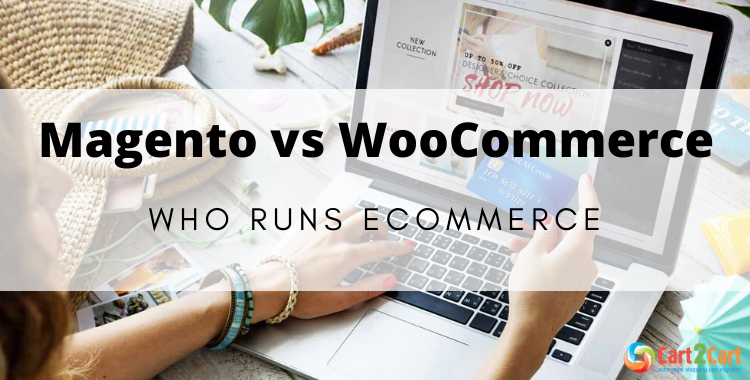Magento vs WooCommerce – two formidable forces in the eCommerce realm. As great as they both Magento and WooCommerce might be, the reality is, no two eCommerce platforms are created equal. Only one can emerge victorious in this head-to-head battle for supremacy.
This Magento (Adobe Commerce) vs WooCommerce review takes an in-depth look at both solutions to help you determine which one will propel your business to the next level.
Table of contents
What Is Magento vs WooCommerce?
Magento is an open source platform built for eCommerce websites. By open-source, we mean that anyone with a coding background can contribute to the development of the software. WooCommerce is also open-source, but it isn’t an eCommerce “platform” per se. It is a plugin that converts any WordPress website into an online store.
Magento vs WooCommerce: Pros and Cons
Below is a list of the benefits and drawbacks of each platform.
Magento Pros
- Scalable with no limit on customization ability.
- Ideal for enterprises with an in-house web development team.
- It integrates third-party payment gateways like PayPal and Authorize.Net straight out of the box.
- Magento offers both free and premium themes.
- It supports a wide range of extensions.
Magento Cons
- Users need some type of web-development experience.
- Configuring a commerce business takes time.
- The additional costs for integrations.
Wish to migrate your e-data just in a few clicks? Try the free Cart2Cart demo migration now!
WooCommerce Pros
- It has a pretty solid SEO framework.
- It is designed for small businesses.
- Supports the sale of an unlimited number of products.
- It comes with a well-stocked theme store.
- Users have access to hundreds of WooCommerce plugins.
WooCommerce Cons
- The WooCommerce plugin only works with WordPress websites.
- It doesn’t support multi-channel selling.
- No dedicated customer support team.
Magento vs WooCommerce vs Shopify vs OpenCart vs PrestaShop Review
Exploring the merits and drawbacks of both Magento and WooCommerce is crucial for a thorough comparison between the two platforms.
| Magento | WooCommerce | |
| Pricing | Typically higher initial costs, but open source community edition available for free | Free base platform, additional costs for extensions and hosting |
| Flexibility | Highly customizable with extensive features and scalability | Flexible, but may require more plugins for advanced functionality |
| Ease of Use | Steeper learning curve, more suitable for experienced users | Beginner-friendly, especially for WordPress users |
| Scalability | Suited for large-scale enterprises with complex needs | Suitable for small to medium-sized businesses, may require more optimization for large-scale operations |
| Themes and Templates | Wide range of professional themes available, with customization options | Plenty of themes available, easy to customize within WordPress ecosystem |
| Extensions/Plugins | Extensive marketplace with thousands of extensions for various functionalities | Vast library of plugins to extend functionality, but may require more integration for complex needs |
| Support | Official support available, plus a large community of developers | Community support, plus resources from WordPress community |
| Performance | High performance, especially for large catalogs and high traffic sites | Performance can vary depending on hosting and number of plugins used |
Magento vs WooCommerce: Key Aspects Comparison
- Magento excels in features and scalability, catering ideally to larger businesses, while WooCommerce prioritizes simplicity and cost-effectiveness, making it a perfect fit for small businesses or users of WordPress.
- Running an online store can vary significantly in cost between the two platforms, with Magento typically entailing higher expenses for hosting, themes, and developer fees compared to the more budget-friendly options offered by WooCommerce.
- Both platforms offer robust security features and a wide range of customization options. However, Magento demands more technical expertise, while WooCommerce is known for its user-friendliness and seamless integration with WordPress.
Ease of Use
While there’s nothing inherently wrong with a somewhat complex platform, it can be a bit of a toughie if you intend to do everything yourself.
Magento is anything but beginner-friendly. The learning curve is steep, and there's a good chance you might need a professional to step in and get things set up for you, similar to how some users opt for an all-in-one migration service to handle complex platform switches.
If you're looking for a platform to DIY an online store, WooCommerce is a no-brainer. It is designed for beginners with no web development background.
Design
The next thing we looked at was the platform’s design from an admin point of view.
Magento scored extra points for its user-friendly dashboard. It is clear the developers took time to make it easy and efficient as far as managing your online store. The navigation is highly-intuitive and smart, allowing store owners to switch between pages seamlessly, regardless of the device they’re using.
WooCommerce uses the WordPress dashboard. It may have the bells and whistles Magento comes with, but it is also quite impressive. The interface is ultra-easy to use and non-obtrusive, which is always a good thing.
Choose the best B2B Shopping Cart for your online store
Pricing
Magento and WooCommerce are both open-source software. It means they are free to install. Keep in mind that just because a particular platform is free to use does not by any means mean there are no costs incurred to run it. Here’s what we mean.
Magento is free to install, but it is a self-hosted platform. You will need to identify a web hosting service and pay for a domain, the hosting solution itself, security, and any extensions you’ll need to enhance the functionality of your site. It could cost you anywhere between a few dollars to a couple hundred.
Magento Commerce is the premium paid version of the platform with out of box features you don’t get with the free version. For those considering an upgrade, a comprehensive Magento data migration guide can be invaluable. Considering updating your Magento store? The exact amount you'll pay depends on your business’ gross revenue.
WooCommerce is a free plugin for any WordPress site. Nonetheless, you will need to pay for WordPress hosting, a domain, and security certificates. The exact cost all comes down to your hosting provider.
Apps and Plugins
Magento’s collection of apps and plugins is nothing short of impressive with thousands of extensions to choose from. From the right POS system for synchronizing orders to a Magento mobile app to boost mobile sales, there's no limit on what your online store can do.
While the WooCommerce extensions store also has a pretty decent collection of apps and plugins, it is nowhere near what Magento brings to the table.
The good news is – both platforms offer managing store data for shipping, accounting, marketing, order management, and lots more. You're bound to find everything you require to enhance your store's functionality.
SEO features
If we had to pick a winner for Magento vs WooCommerce SEO, it would have to be Magento.
Don’t get us wrong. There’s nothing wrong with WooCommerce since its SEO rides on WordPress as its foundation. It means you don’t have to incorporate a blog function to add content capability. Plus, it gives you access to popular optimization tools like Yoast.
The reason we went with Magento has to do with all the built-in prompts and guides it has compared to WooCommerce. These nudge you to add extra elements to make your store visible to search engines. This sophisticated SEO toolset gives Magento a slight edge over WooCommerce on that front.
How to migrate from Magento to WooCommerce
Security
As far as Magento vs WooCommerce security goes, both platforms require you to be hands-on since they are technically self-hosted. It means that you'll need to install relevant security plugins from their respective extensions stores to keep your online store safe from hackers. Similarly, ensuring a secure process during data migration is critical, which is why understanding the security policy of your migration service is essential. For a thorough overview, consult our migration checklist. Some of these usually have a subscription cost attached to them, so keep that in mind as well.
Take your e-business a step forward towards success!
Our dedicated customer support team is here to ensure your journey is smooth sailing. With prompt assistance and personalized solutions, we're committed to helping you overcome any hurdles and achieve your goals. From technical queries to strategic advice, count on us to be your trusted partner every step of the way.
Migrate nowCustomer Support
Magento and WooCommerce are both open-source platforms. Like most open-source software, they do not have a dedicated customer support team on standby. Magento’s support comes in the form of the community of Magento developers and the comprehensive library of resources you can use to find a solution to your issue.
The same goes for WooCommerce. There’s the option to consult the vibrant community of online users, consult a WooExpert, or use the site's FAQ section to find an answer to your specific question.
Check out our infographic to get a better understanding of the migration process via Cart2Cart:
Magento vs WooCommerce FAQs
Is WooCommerce better than Magento?
It depends on who you ask. WooCommerce trumps Magento in terms of ease of use. It is designed to be user-friendly, which explains why it is one of the leading eCommerce platforms worldwide. From a performance standpoint, Magento scores higher mainly because of its unlimited scalability and customization abilities. It all depends on your end goal.
Is Magento better than WordPress?
Yes, it is. As an eCommerce solution Magento is more powerful and supports unlimited scalability. This is what you want when you’re running a medium to large-scale enterprise. However, it does fall short when it comes to the number of themes it offers.
Is Magento good for eCommerce?
Yes, it is. The platform is built as an enterprise-level eCommerce solution for bigger sites that require advanced features and enhanced functionality. This also makes it more technical, meaning you may need some knowledge of web development.
Does Magento work with WordPress?
No, it does not. Magento and WordPress are two independent platforms. If you're presently running your online store on WordPress and want to switch to Magento (or vice-versa), you would have to use a data migration tool like Cart2Cart. All your store data like order, product, and customer files will be automatically transferred to the new platform with a few easy clicks.
The Verdict
Magento vs Woocommerce – which of the two solutions have we crowned the winner? The truth is that they are both amazing in their own right. They are scalable, secure, and capable of hosting robust online stores. For a comprehensive strategy, review our roadmap for successful re-platforming. The choice you make comes down to your priorities.
Leave a Reply Cancel reply
For a user-friendly platform with an extensive array of themes to choose from, WooCommerce might be just what the doctor ordered. If you want something more powerful, Magento stores are designed for enterprise-level commerce businesses.
What can we do for you?
In case your current solution lacks some advanced functionality, you can transfer your data from Magento or WooCommerce or vice versa. Cart2Cart automated migration tool can help go through the migration procedure without intensive hands-on. Get your store to a new level and enjoy the excellent functionality of the desirable platform with our Ultimate Data Migration Service.
Are you thinking of switching from your current eCommerce platform? Sign up to Cart2Cart today for a free demo.
Monthly Update – January 2026
As we step into January 2026, the eCommerce landscape is rapidly evolving with a strong emphasis on AI-driven analytics and enhanced customer privacy. Businesses leveraging platforms like Magento and WooCommerce are increasingly focusing on utilizing predictive AI to personalize user experiences, streamline inventory management, and optimize marketing campaigns. This shift is enabling smarter, more efficient operations and providing a competitive edge. Concurrently, data privacy regulations continue to tighten globally, prompting stores to adopt advanced security protocols and transparent data handling practices. Merchants are finding innovative ways to balance personalization with user consent, building greater trust. The integration of augmented reality (AR) for product visualization is also gaining traction, offering immersive shopping experiences that bridge the gap between online and in-store. Staying ahead means constantly evaluating your platform’s capabilities and readiness for these dynamic shifts. Seamless data migration and robust platform customization are more crucial than ever to adapt to these trends.
For more details, explore our FAQ section or schedule a call with a migration expert.












